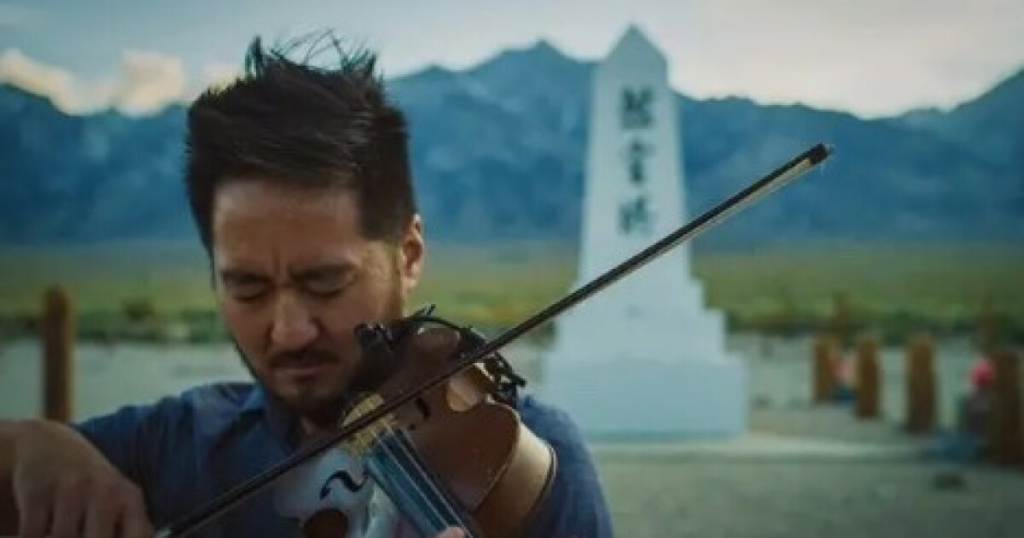ALLENTOWN, Pa. — After making an album that served as the soundtrack for his film detailing the struggles of incarcerated Japanese Americans during World War II, violinist Kishi Bashi said he needed a breather.
Making the film, „Omoiyari: A Songfilm by Kishi Bashi,“ took him „on a musical journey to understand WWII era Japanese incarceration, assimilation and what it means to be a minority in America today,“ the film’s website says.
“That was a really long process, and what I ended up doing is creating other kinds of music,“ Bashi says in a phone call while he was taking a mountain drive near San Jose, California, where he lives.
“And so anyways, I just wanted to do something different, conceptually and also musically. And it was kind of a breath of fresh air.“
Bashi’s most recent album, „Kantos,“ released last August, certainly is that.
A kaleidoscopic journey inspired by sci-fi, philosophy and ancient ruins, the album blends such disparate influences as Brazilian jazz, 1970s funk, pop and even punk.
Bashi said he’ll play some from each disc — as well as the three earlier discs in his catalog — when he performs at 7 tonight, May 6, in The Arrow room at Allentown’s Archer Music Hall.
Tickets, at $38.50 for general admission standing, remain available at The Archer website.
Bashi said that when he finished „Omoiyari,“ he originally „wanted to develop these, like, electronic ideas, and just keep that, like, on the grill.“
„But it just never felt right, it never felt like I could release them,“ he said.
So he fell back on his broad pallet of influences from his alma mater, Berklee College of Music, Bashi said.
„Like, jazz fusion from the ‘70s and punk, that was like my jam, and my love,“ he said. So the new album „was kind of, like, that’s my background.
“So I love Brazilian music, love funk, jazz and rock.
„And there was a time in my life where I would just scour the vinyl earth for, like, anything funky, or instrumental. That usually ended up being stuff from the ‘70s, early ‘80s.
“And so I came to put those elements into my music, ‘cause I know that there’s people out there that I feel the same — get excited by that kind of music.“
While Bashi achieved his goal of a breath of fresh air with „Kantos,“ he conceded that „Omoiyari“ was a watermark for him — his first disc to hit the Top 10 — in this case, on the Indie chart.
“It was very adventurous, but it also was very folky,“ Bashi said of that disc. „And I feel like the way I recorded it — I recorded it with a live band — so it had a very, like, gentle element.
„But then if you peel that layer back, it’s also a lot of meaning and a lot of consequence to a lot of the stories I’m trying to tell.
“And so I think it was an interesting project to a lot of people and, like, it was a very easy album to listen to. I think it’s very beautiful.”
Bashi also has recorded and toured with artists such as Regina Spektor, Sondre Lerche and indie band of Montreal, and appeared on „Saturday Night Live,“ „Late Night With David Letterman,“ „Conan“ and „The Tonight Show with Jimmy Fallon.“
But before „Omoiyari,“ Bashi was perhaps best known for the use of his music in movies, television and even commercials.
He has had songs appear in the films „The Babysitters Club“ and „The Banana Split,“ and the TV shows „God Friended Me,“ „Into the Dark“ and „Atypical“ and the DC Universe’s „Titan“ series.
„I used to work as a film composer, and it’s really hard to get, like, that working,“ Bashi said. „But when I spent more time concentrating on the music, pure music, it definitely, like, helped, and now I don’t have to worry about it.”
His original music also has been featured in commercials for Microsoft, Samsung, American Express, Target and Apple.
Bashi also said he works with a company „that’s always, like, pitching stuff. So that’s one part of it; there’s no secret to it.“
„But I think a lot of people have my music, like, in their playlist,“ he said. „So when they’re editing the movie, or the director is, like, wanting something that drives emotion, I have a few songs like that.“
Bashi said he also continues to work with two orchestras — in Chicago and Miami.
„And so I’m kind of going down this, like, orchestral rabbit hole and I love to play with orchestras. I usually have a really intense fall tour — I do that in Europe so I’m still recovering from that,“ he said with a laugh.
“So the next year, I’m just really kind of thinking about what direction to go next.”
In the meantime, he’s on the tour that brings him to The Archer.
He’s playing with two friends — „a psychedelic banjo player, and amazing cellist. We’re all plugged in and loud, so it’s great.”
The show will be „kind of like a retrospective of my career,“ he said. „So I do a little bit of my new album, but I go through each album and I kind of, like, talk about how this album came to be.“
If it seems odd that a concert by a violinist will be general admission standing — as The Archer show is — Bashi said it’s not.
„As a viewer, I go to a concert, I like sitting down,“ he said. „So that’s also a great experience for just relaxing, not get somebody’s beer spilled on you. So I appreciate that — I know how great that can be, also.”
But he said that, „to me, from the stage, the energy’s always better when everybody’s just packed in in front of you.“
